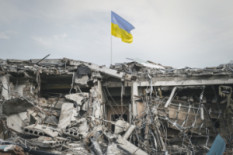Given the large number of veterans expected in Ukraine after the war, it is crucial for the state to carefully plan and execute programs for the adaptation and socialization of defenders and their family members, as well as families of fallen soldiers.
The Ukrainian Veterans Foundation (UVF) and the Sociological Group "Rating" conducted a nationwide survey titled "The Image of Veterans in Ukrainian Society." We will provide you with the main points of the analytical review by Alla Dvigun, an expert from the National Institute for Strategic Studies under the President of Ukraine.
UVF and "Rating" analysts have recorded a deterioration in society's expectations regarding the future of veterans of the Russian-Ukrainian war, as well as regarding the government's fulfillment of its obligations to the military.
In July 2022, 55% of respondents spoke of unquestionable respect for veterans in society, but by September 2023, this figure had dropped to only 25%.
Respondents also anticipate an increase in potential risks in veterans' lives, including unemployment, family conflicts among veterans, substance abuse, and suicides among combatants, among other concerns.
Particular attention is needed to the risk of post-traumatic stress disorder (PTSD) developing among a significant number of Ukrainian citizens. According to the World Health Organization report, nearly 10 million residents of Ukraine may face psychological problems, as millions of civilians in Ukraine inadvertently became participants in hostilities.
Overall, in Ukraine, at least 1.5 million fellow citizens with experience in military actions will require special attention and care. Together with the family members of veterans and fallen soldiers, this number could reach 4 million people in 2024, increasing with each passing year of conflict.
Key Aspects of Veterans' Adaptation
The adaptation of war veterans is a complex and multi-level issue that requires systematic cooperation between the government, civil society, veterans, and international communities. Currently, Ukraine urgently needs to implement comprehensive mechanisms to support veterans, their family members, and the families of the fallen. This will help mitigate potential problems and ensure a dignified and quality life.
Rehabilitation and Reintegration: Veterans should have access to quality medical care and psychological rehabilitation, including prevention and treatment of PTSD. Reintegration also means providing opportunities for education and skill development to help veterans find employment and integrate into society.
Social Guarantees: Veterans require various forms of support, including financial compensation, medical assistance, education, and housing. Existing legislation provides a wide range of guarantees, but not all are readily accessible to everyone. Specifically, military personnel and veterans residing in large cities have greater access to social guarantees than those in smaller communities. Therefore, it is essential to provide these benefits and ensure they are equally accessible to all.
Housing: Currently, unfortunately, the state's resources do not allow for meeting the demand for housing for all veterans. Therefore, it is necessary to initiate the creation of new laws and implement other mechanisms and tools to expedite the acquisition of housing.
Social Support for Families: Psychological and financial support for families is an essential component of the adaptation process and also requires systematic efforts from the government.
Public Awareness and Support: It is crucial to promote a positive attitude towards veterans in Ukrainian society, and well-thought-out integration mechanisms should safeguard veterans from stigmatization. Information campaigns and education should contribute to this goal.
Professional Training and Employment: Veterans must have the opportunity to requalification and acquire new skills that will enable them to find employment after the war. Comprehensive training programs and access to an updated job market should be established and implemented.
Failure by the state to fulfill its obligations can lead to social tension, a scenario witnessed in the post-war histories of various countries around the world.
Pathways to Resolution:
At the national level, there has long been a need for services and programs with a strong social function, and initial steps have been taken.
- The Ukrainian Veterans Foundation (UVF) operates a Crisis Support Hotline, which is part of the All-Ukrainian Mental Health Program "How Are You?" This program involves the participation of all organizations and members of society.
- A unified electronic state registry of war veterans has been created and implemented. It contains data on combatants of all categories, individuals with disabilities due to the war, and the families of the fallen.
- On July 1, 2023, a pilot project called the "Institute of Assistant Veteran" was launched in four regions of Ukraine. According to the project, the primary task of a veteran's helper is to provide comprehensive assistance to Ukrainian defenders during their transition from military service to civilian life. Helpers for veterans will work within the community, with each one assisting a hundred veteran families. In October 2023, the project expanded to six more regions, receiving 44.2 million Ukrainian hryvnias in government funding.
More about the Veteran's Helper:
The main idea behind the introduction of the veteran's helper is to ensure diverse support for veterans from someone with experience and understanding of all the challenges veterans may face upon their return. This person could be a comrade who returned earlier, completed the veteran's journey in the community, received proper training, and is employed as a veteran's helper.
The primary duties of a veteran's helper include:
- Monitoring the needs of veterans, including the use of digital tools provided by the Ministry of Veterans Affairs.
- Informing veterans about support programs.
- Providing advice on accessing guarantees, benefits, rights, document processing, and obtaining public services.
- Facilitating communication between veterans and service providers, analyzing satisfaction levels with the quality of services, and proposing improvements.
- Suggesting ways to enhance the community's capacity to meet veterans' needs, actively involving veterans in community life, and utilizing their potential for the region's and society's development.
From the moment defenders return from the frontlines, a veteran's helper ensures their quality integration into communities, families, and the economy at both micro and macro levels, and further strengthens their leadership role within the veteran community. For more information on the "Veteran's Helper" project, please follow the link.
Existing projects and services are only a part of the systematic work needed at the national level to address the issues of adaptation for veterans of the Russian-Ukrainian war and provide assistance to all Ukrainian defender families. There is much work to be done, requiring the involvement of a broader spectrum of Ukrainians at various governmental and civic levels, regardless of their social status.







